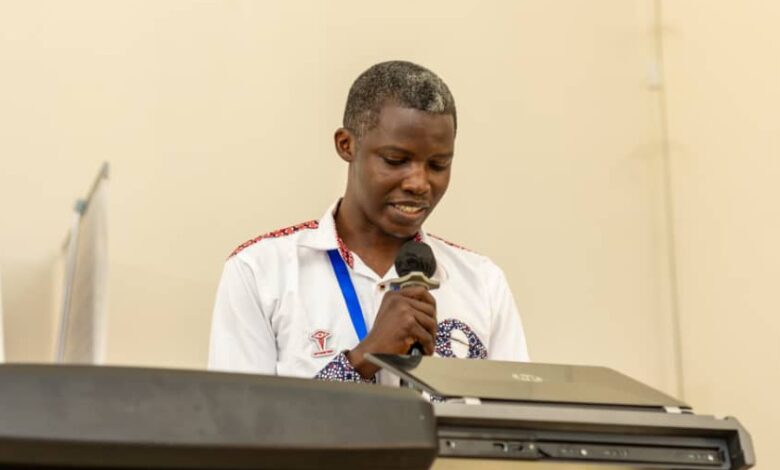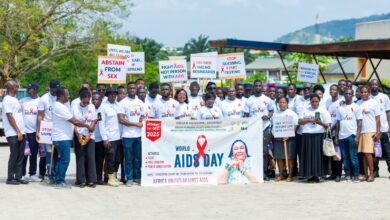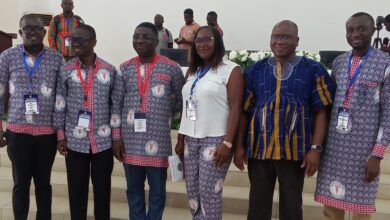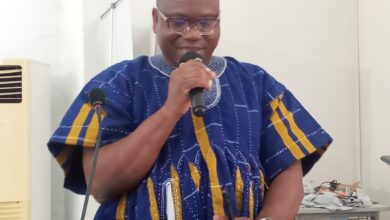Lecturer Calls for Urgent Reforms in Low Vision Care

Dr. Carl Halladay Abraham, a lecturer at the Department of Ophthalmic Science at the University of Cape Coast, has called for stronger policy action, improved funding, and greater recognition for low vision care in Ghana, describing it as “an act of justice” rather than charity.
Delivering the keynote address at the Ghana Optometric Association’s Annual General Meeting and Scientific Session held at the Kwame Nkrumah University of Science and Technology (KNUST) on Friday, October 18, 2025, Dr. Abraham spoke on the theme “Low Vision Rehabilitation: Breaking Barriers and Building Bridges.”
He noted that low vision rehabilitation — which helps people with partial sight live independently — remains one of the most neglected areas of eye health despite its growing impact.
“Across the world, over 295 million people live with moderate to severe visual impairment. In Ghana, approximately 1.2 million people are affected — almost the population of the Bono East Region,” he revealed.
According to Dr. Abraham, who is also a low vision care and rehabilitation practitioner, the cost of vision impairment extends beyond individual hardship to significant national economic losses. “When people lose their vision, we as a country lose money. Ghana loses about 350 million dollars annually due to loss in productivity and wages,” he said, emphasizing that “the issue of low vision rehabilitation must be part of the national development reset.”
‘This Must Change’ – Dr. Abraham Urges Policy and Funding Reform
Dr. Abraham identified poor governance, lack of data, inadequate funding, and the absence of a national policy as major barriers to effective low vision care.
He lamented that the World Health Organization’s monitoring framework largely sidelines low vision indicators. “Low vision is mentioned only twice, while cataract appears over 70 times,” he remarked humorously, adding, “It’s not that we are jealous, but what is good for Bruno, the German shepherd, is also good for Bingo, our local dog.”
He further called for statutory and sustainable funding for the Ghana Eye Care Secretariat, which he said remains overly dependent on donor support. “He who gives chop money determines the dish and gets the biggest fish in the soup,” he quipped.
Dr. Abraham also urged the establishment of a clear national policy on low vision rehabilitation to guide workforce training, facility expansion, and access to assistive devices.
Recognition and Accessibility
He bemoaned the lack of recognition for low vision practitioners, many of whom spend hours with patients without incentives or promotion. “This must change,” he repeated throughout his address, calling for better professional acknowledgment and investment in low vision technologies.
On accessibility, Dr. Abraham emphasized that Ghana’s infrastructure continues to exclude people with disabilities. “There shouldn’t be a single infrastructure in this country built without considering persons with disabilities — not one,” he stated passionately.
He cited the late Dr. Pascal Michel Tchiakpe of KNUST, a pioneer in low vision care, who decried Ghana’s poor enforcement of disability-friendly design standards despite existing laws.
Real Lives, Real Impact
Dr. Abraham, who is also a consultant at Caraham Ophthalmics — a low vision aids and equipment supplier — and a PhD candidate at the University of KwaZulu-Natal, shared touching stories of two of his patients: a retired lecturer who regained the joy of reading with a magnifier, and a nine-year-old boy who returned to school after rehabilitation and later represented his school in a quiz competition.
“These are the people who don’t get counted,” he said. “But their stories show what we can achieve when we break barriers and build bridges.”
A Call to Action
Concluding his address, Dr. Abraham urged stakeholders to make low vision rehabilitation a national priority.
“Low vision rehabilitation is not an act of charity — it is an act of justice,” he declared. “When we empower someone to read again, to navigate their community, or to return to work, we restore not only sight but personhood.”
He called on policymakers, educators, and practitioners to strengthen referral networks, integrate low vision services into primary healthcare, expand training opportunities, and ensure that persons with visual impairments are included in decision-making.
“The barriers are many,” Dr. Abraham concluded, “but we have the capacity to build ten bridges for every barrier.”






